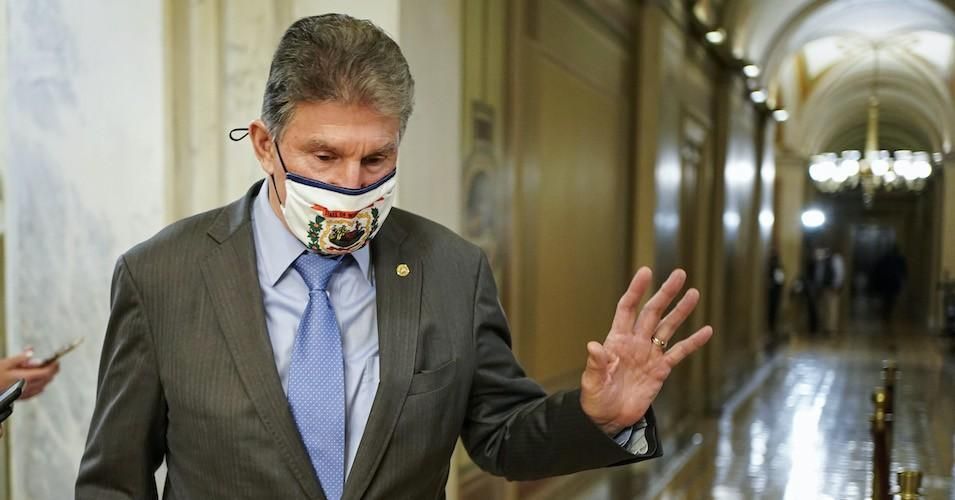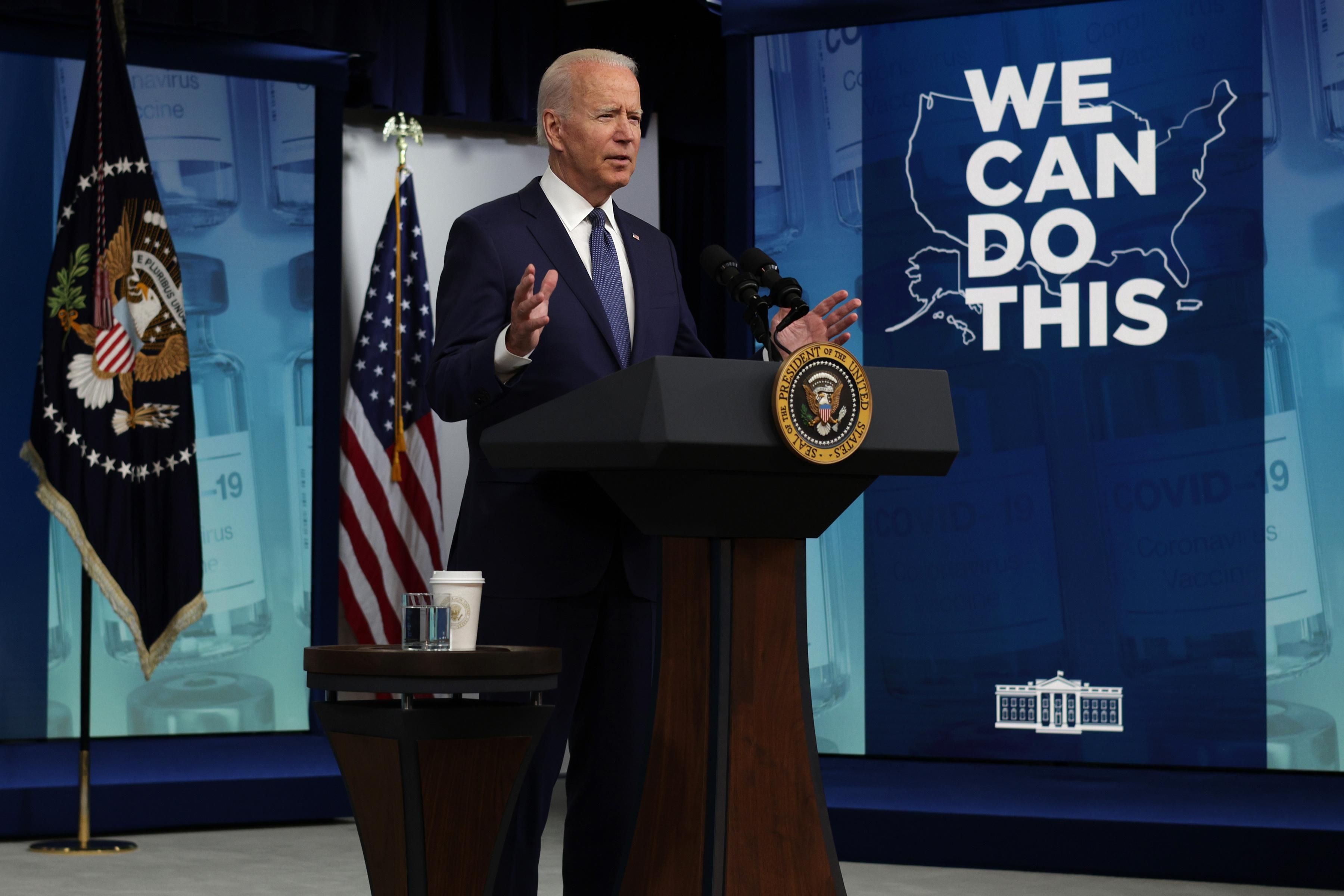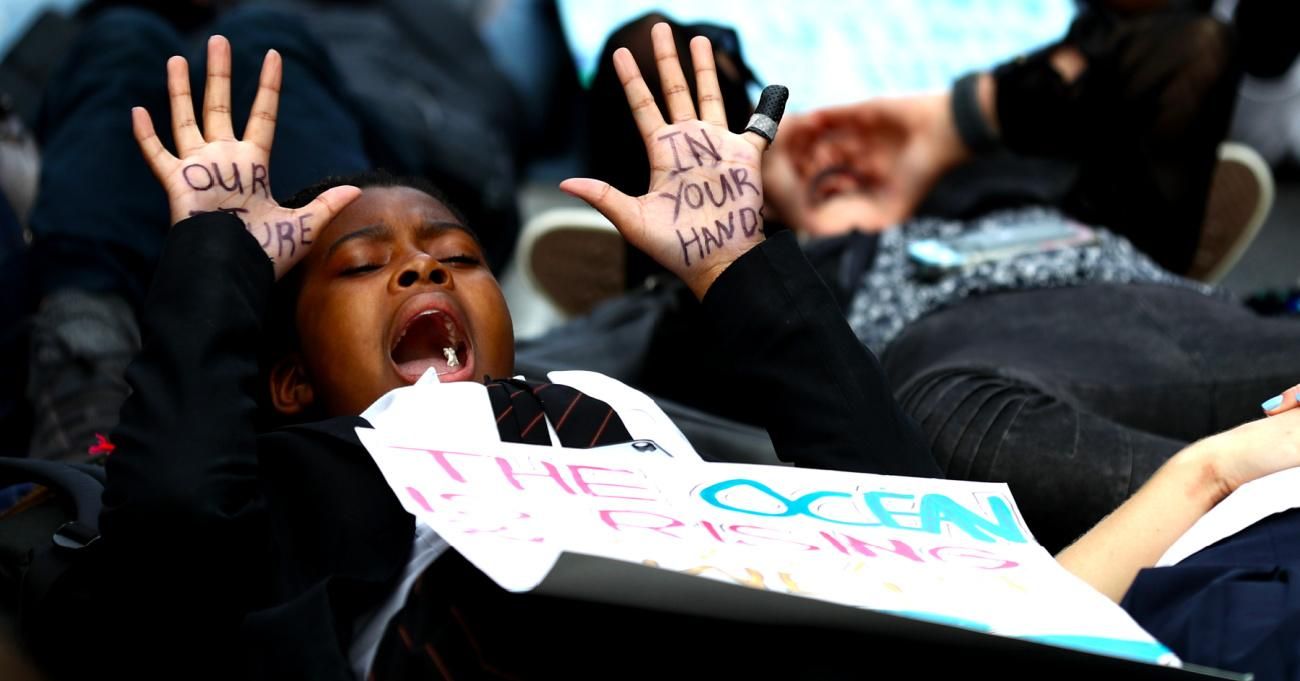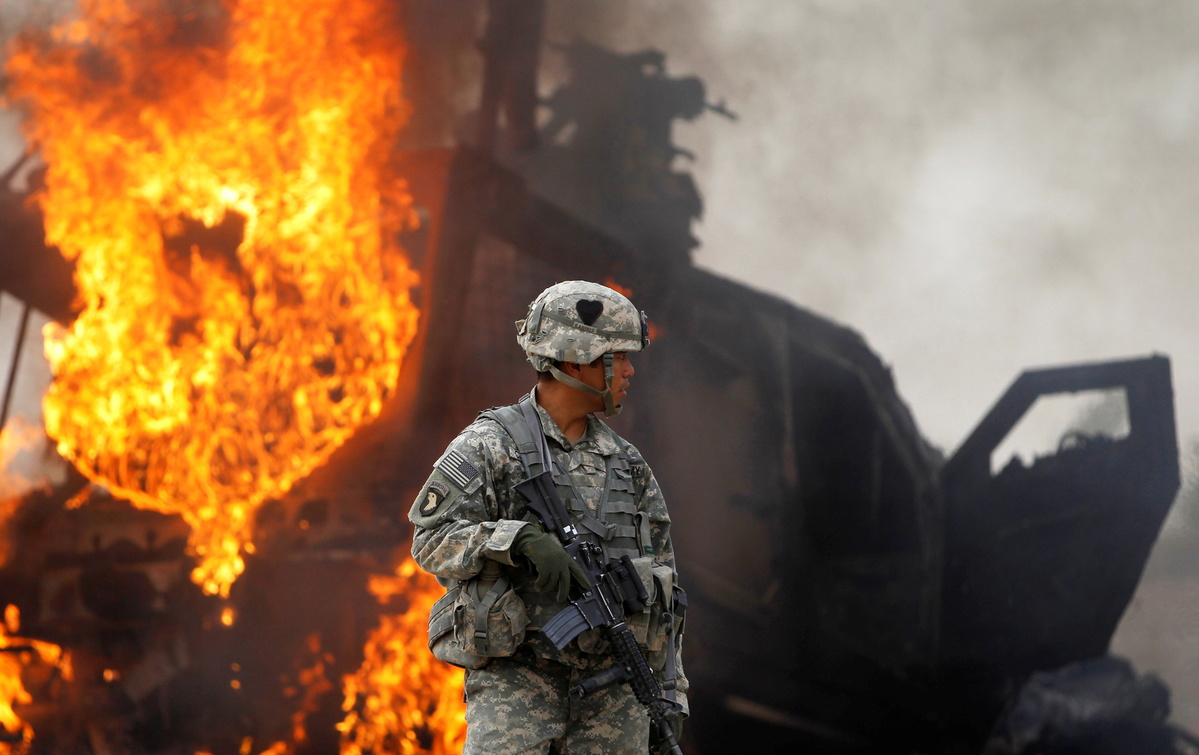The U.S. is the only liberal-democratic country in the world with a political system set up for two mainstream parties, a long and continuous history of union suppression, and without a major socialist party at the national level.

Sen. Joe Manchin (D-W.Va.) departs after the day's proceedings in the impeachment trial of former President Donald Trump at the U.S. Capitol on February 10, 2021 in Washington, D.C.
C.J. POLYCHRONIOU
How is it possible that the world's largest economy has a crumbling infrastructure ("shabby beyond belief" is how the CEO of Legal & General, a multinational financial services and asset management company, described it back in 2016), and ranks in the lower half of second tier countries, behind economic powerhouses Cyprus and Greece, on the 2020 Social Progress Index?
It's the politics, stupid!
The United States is the only liberal-democratic country in the world with a political system set up for two mainstream parties, a long and continuous history of union suppression, and without a major socialist party at the national level. Indeed, the countries that perform best on the Social Progress Index have multi-party systems, strong labor unions, a plethora of left-wing parties, and adhere to the social democratic model.
In other words, politics explains why the United States did not develop a European-style welfare state. Political factors also explain why economic inequalities are so huge in the US and the middle class is shrinking; why the quality of America's health care system is dead last when compared with other western, industrialized nations; why there are millions of homeless people; and why the infrastructure resembles that of a third-world country.
The American welfare state is organized around different principles (it functions primarily around tax expenditures and public-private partnerships) than the welfare state in other advanced nations, thanks to the dominance of conservative modes of thinking with regard to the relationship between individual and society.
However, for the first time in many decades, the country faces the prospect of the reshaping of federal government priorities, thanks to a large social spending package which includes an infrastructure bill with $550 billion in new spending and a $3.5 trillion budget blueprint intended for investments in social programs and combatting global warming. Sen. Bernie Sanders has described the $3.5 trillion budget plan as "the most consequential piece of legislation for working people, the elderly, the children, the sick and the poor since FDR and the New Deal of the 1930s," although it is highly questionable if the funding level of the reconciliation bill is sufficient enough to address the pressing needs of the country. There Is a Problem With the Infrastructure and Budget Bills—They're Too Small (truthout.org) More importantly, poll after poll shows that the majority of the American people support Biden' social spending package, Most back Biden's infrastructure bill and budget plan: Poll (usatoday.com), even though the President's approval rating is slipping fast Polls show Biden's approval rating sliding to new lows— POLITICO and Republicans may very well flip the House in 2022.
But huge contradictions have become, after all, the centerpiece of US politics, as we will see below.
Now, in the event that the Democrats manage to pass the reconciliation bill (which they can do with a simple majority rule), America's social safety net will undoubtedly be expanded, but it will still fall short of closing the gap with its liberal-democratic peers with respect to social protection policies. The reason is that the American welfare state is organized around different principles (it functions primarily around tax expenditures and public-private partnerships) than the welfare state in other advanced nations, thanks to the dominance of conservative modes of thinking with regard to the relationship between individual and society (partly due to the influence of the Protestant work ethic which looked with suspicion of anyone who is poor, and partly due to free-market economics which rejected outright the role of the government in promoting overall social well-being), but also due to the uniqueness of American federalism.
European governments, to be sure, and regardless of whether they are using the Nordic or the Christian-Democratic socioeconomic model, have far more generous social programs than those provided by the US government (total expenditure on social protection benefits in the EU is equivalent to approximately 27 percent of GDP, while in the US it is just over 18 percent of GDP) and they reach a significantly larger share of citizens. Europeans spend several times more on unemployment insurance, and their governments engage in more direct regulations in order to protect workers against business interests.
Unsurprisingly therefore, even in the age of global neoliberalism, where social programs are under constant siege, the welfare state remains an ideal that most Europeans treasure regardless of partisanship. For instance, the National Health Service ranks consistently as the institution that brings more pride to British people, far more so than British history, the Armed Forces, and the Royal Family.
Indeed, why would anyone, other than the very rich, be opposed to the idea of universal health care, let alone vacation as a right guaranteed by law?
But let's return to Biden's $3.5 trillion budget plan, which heralds a new era of "big" government in U.S politics. We already know that no Republican will support it. Republican lawmakers oppose expanding federal spending on social programs, but do support extra spending on immigration enforcement and defense. And they are unified in the effort to protect Trump tax cuts, which means they oppose Democrats' plan to increase taxes on corporations and the very rich.
When not reciting bogus arguments about deficits and debt in connection with increased federal spending, Republicans have always opposed every new social program targeted on the poor and average folks on purely ideological grounds. For them, the welfare state leads inevitably to socialism (and, for the grandfather of neoliberalism, F. A. Hayek, to totalitarianism), but naturally they keep silent about the massive government support that the corporate and financial industries receive when their fortunes turn sour. Neoliberalism's Bailout Problem | Boston Review So it's Ok to offer socialism to the rich. But for everyone else, brutal capitalism should be the order of the day.
Indeed, it is worth recalling why Ronald Reagan opposed the enactment of Medicare in the early 1960s. He warned that if it was enacted, "behind it will come other federal programs that will invade every area of freedom as we have known it in this country. Until, one day, as Norman Thomas said, we will awake to find that we have socialism."
However, it is not only Republican lawmakers who resist social welfare programs. So-called "moderate" Democrats also have an ugly history of throwing up roadblocks. After all, it was Democratic President Bill Clinton who made the biggest reactionary shift in social policy since the Great Depression when he signed the Personal Responsibility and Work Opportunity Reconciliation Act, which essentially put an end to welfare as an entitlement program.
Today, "moderate" Democrats are also throwing up roadblocks to Biden's $3.5 trillion budget plan, with Senator Joe Manchin leading the way. He considers the price tag of the reconciliation bill too big (of course, he would never express opposition to the humongous amount of money the US spends annually on the military—$704 billion for the fiscal year 2021, which amounts to 11 percent of federal spending), and objects to efforts in the bill to combat the climate crisis by spending money for a transition to clean energy.
As things stand, "moderate" Senate Democrats like Mancin will most likely consent only to a much smaller price tag of the reconciliation bill and as long as there are no taxes on the superrich or corporations.
Why Manchin, who opposed the For the People Act, has taken a strong position against ending or even weakening the filibuster, and has always sided with business interests, is considered by the media and political pundits in this country as a centrist or so-called "moderate" Democrat will surely baffle anyone outside the United States. In the political culture of European states, Manchin's stance on critical economic, social, political, and environmental issues places him squarely in the reactionary camp. He would be seen and treated as an outright right-winger.
In a similar vein, most so-called "progressive" lawmakers in the US would be regarded as "moderates" at best in the European political spectrum. Financial Times editor Rana Foroohar may have engaged in a slight exaggeration when she remarked in a recent video interview that Bernie Sanders' policies place him "pretty close to your average German Christian Democrat," Age of Economics but not by much at all when we consider the fact that Bernie Sanders is fighting for economic and social rights that already exist in most European countries.
A similar point can also be made with regard to the climate emergency. While most Europeans believe the climate crisis is real and caused by human activities, in the US there is still a debate about what is happening to the planet and why, which surely explains the reason why the US is lagging far behind Europe on climate change goals. Even Europe's oil and gas companies are way ahead of their rivals in the US in reducing their reliance on fossil-fuel sales, and they are investing far more on renewable energy, carbon capture, and other decarbonization undertakings.
All of the above are connected to the nature of the political spectrum that exists in Europe and, more specifically, to the European social model with its emphasis on social protection, pensions, public services, workers' rights, quality of jobs, working conditions, and environmental concerns, even though, it should be pointed out, the social model has been under attack since the early 1980s and has certainly been weakened as a result of European Union policies promoting market efficiencies, liberalization and competition law, privatization, and financialization.
Moreover, none of the above is meant to convey the idea that the US should necessarily try to imitate the European Social Model. At this historical juncture, the US should be leaning forward into a path of economic development, social justice, and environmental sustainability structured around a Green New Deal. This is a truly bold plan to reshape the US economy and eliminate the greenhouse gases responsible for global warming. The switch to 100 percent clean and renewable energy sources will surely change the face of "really existing capitalism."
In the meantime, it is vitally important that we keep in mind the reasons why the US has a third-world infrastructure and ranks far behind virtually all other advanced countries on the Social Progress Index. And let's stop using meaningless terms to describe the policies and ideological stance of people like Joe Manchin. So-called Democratic "moderates" are dark political forces that belong without the slightest doubt to the reactionary Right of the political spectrum.
Our work is licensed under Creative Commons (CC BY-NC-ND 3.0). Feel free to republish and share widely.

C.J. POLYCHRONIOU is a political economist/political scientist who has taught and worked in numerous universities and research centers in Europe and the United States. His latest books are Optimism Over Despair: Noam Chomsky On Capitalism, Empire, and Social Change" and "Climate Crisis and the Global Green New Deal: The Political Economy of Saving the Planet" (with Noam Chomsky and Robert Pollin as primary authors).






